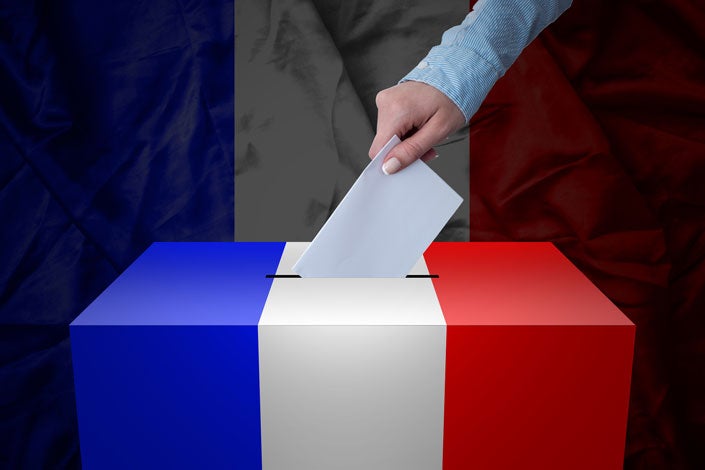Stanford professor discusses what’s at stake for Europe as runoff for French presidency nears
Cécile Alduy, a professor of French and Italian and expert in contemporary French politics, analyzes France’s presidential runoff on Sunday between Emmanuel Macron and Marine Le Pen.

Distrust of French voters for their politicians has never been so high, says Professor Cécile Alduy, an expert in contemporary French politics. (Image credit: Getty Images)
Europe’s attention Sunday will certainly be focused on France, where centrist Emmanuel Macron and far-right candidate Marine Le Pen are pitted in a runoff for the French presidency.
Stanford News Service spoke to Cécile Alduy, a professor of French and Italian and expert in contemporary French politics, about Sunday’s runoff and the impact it could have across Europe.
The runoff is billed as an election between two “outsiders,” not from the traditional left-right system. What does it say about the state of France that these two candidates have reached this position?
The level of distrust – and even disgust – of French voters for their politicians has never been so high. According to a March 2017 poll, 82 percent of the French think their politicians are “corrupted,” 67 percent are “disappointed” by them, 44 percent are “disgusted” and 42 percent “angry.” This gives you a taste of their disenchantment and the intense thirst for something new.
Le Pen and Macron have positioned themselves as – rather than truly are – “outsiders,” “anti-system” candidates, an “alternative” to the “same old” alternation of right and left in the last decades.
Has the candidates’ rhetoric changed since the field was dwindled from 11 to two?
The rhetoric in this second-round campaign is at once more unifying and more divisive: Both want to embody the nation and appear as capable of rallying support from other groups, and both need to attack their opponent through negative campaigning to appear by contrast a better choice. Both Macron and Le Pen have been more aggressive against each other – to the point of brutality in the second-round debate held on Wednesday.
Which issues will be top of mind for French voters when they make their choice on Sunday?
According to French polls, the economy and terrorism are listed as the top two priorities. But National Front [a right-wing political party formerly led by Le Pen] voters prioritized immigration, terrorism and security, while Macron voters listed unemployment, purchasing power [better wages] and growth as their top priorities. Among voters on the left, social injustices, unemployment and purchasing power were high; while on the right, reducing the debt, terrorism and immigration were high. The electorate is very divided on what are the top priorities.
Macron is leading in many opinion polls and the majority of the other presidential candidates have come out in support of him. Has Le Pen done enough in the past two weeks to make up ground and seriously challenge Macron?
No, she has not, and she has – I believe – definitely killed her chances of rallying more support with her aggressive, inarticulate performance in the second-round debate. Before that, she has tried to appear presidential and ready to compromise, passing an agreement with a small conservative party – Debout la France, led by Nicolas Dupont-Aignan – in exchange for its support. But she butchered her own image and appeasement strategy by going relentlessly on the attack after Macron – who remained calm and presidential throughout – in the debate. Even National Front voters were disappointed by her lack of clarity, her aggressiveness and her lack of presidential stature.
What signal does a Macron victory send to Europe? What signal does a Le Pen victory send?
[A Macron victory] is a very strong signal because he has been by far the most Europhile – favoring participation in the European Union – of all the candidates. His project is to put France at the center of Europe and build a stronger France for a stronger Europe. He is widely recognized by European leaders, including German Chancellor Angela Merkel and Yanis Varoufakis, Greece’s former minister of finance, as someone who will improve and strengthen France’s leadership in Europe. It’s a strong signal after Brexit.
On the other hand, a Le Pen victory – which is highly unlikely – would signal probably the end of the European Union. After Brexit and Donald Trump’s surprise win, this one would send a shockwave throughout the world: Another populist, anti-immigration, protectionist leader would have succeeded in taking power in a western democracy, destabilizing potentially NATO, the EU and the free movement of people and commerce in the world. A realignment of France with Russian President Vladimir Putin would have lasting effects in Ukraine, Crimea and the Middle East. Not to mention a very bleak future for foreigners, immigrants and their descendants in France.
